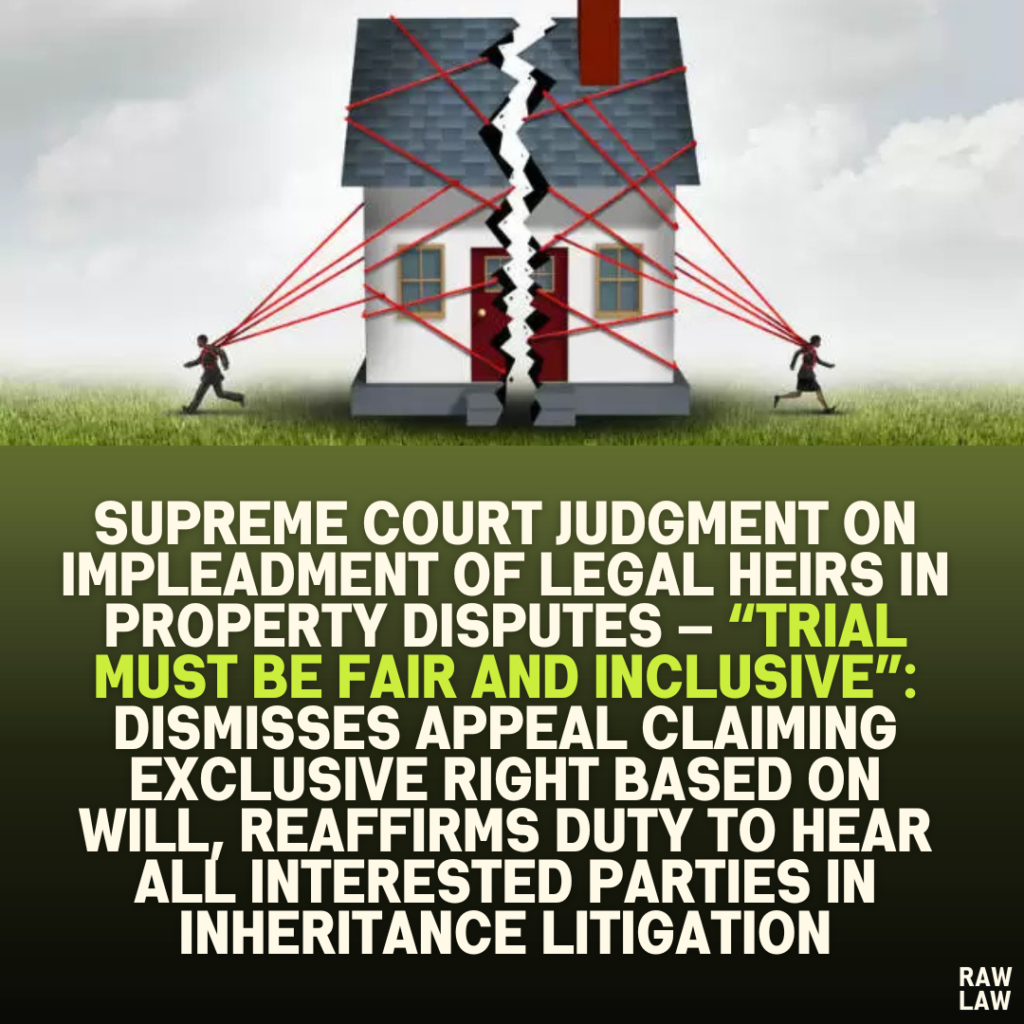Court’s Decision
The Supreme Court dismissed the appeal, upholding the orders of the High Court and the Trial Court. The Court emphasized the importance of including all necessary parties in a legal dispute to ensure a fair determination of the matter. The impleadment of a legal heir as a defendant was deemed appropriate, rejecting the appellant’s objections.
Facts
A civil suit was originally filed for declaration and recovery of possession by a plaintiff. During the pendency of the suit, the plaintiff passed away, leading to legal proceedings regarding the substitution of legal heirs. The appellant, claiming to be the sole beneficiary under a registered will, sought to be substituted as the plaintiff. The Trial Court initially rejected the application due to the absence of a legal heir certificate and the need to implead other heirs. However, the Supreme Court, in a prior ruling, reinstated the application for reconsideration, leading to the appellant’s substitution as the plaintiff. Subsequently, another legal heir filed an application to be impleaded as a defendant, which was allowed by the Trial Court and upheld by the High Court. The appellant challenged this decision before the Supreme Court.
Issues
- Whether the appellant, as the sole beneficiary under the will, had an exclusive right to pursue the suit without impleading other legal heirs.
- Whether the impleadment of another legal heir as a defendant was legally justified.
- The extent of judicial discretion in ensuring all relevant parties are heard in a property dispute.
Petitioner’s Arguments
The appellant argued that the Supreme Court had previously recognized his right to be substituted as the plaintiff, which should preclude any other heir from being impleaded. He contended that the will in his favor was sufficient to establish his sole claim over the property, and the addition of another heir as a defendant was unnecessary and legally untenable.
Respondent’s Arguments
The respondent, seeking impleadment, contended that she was a direct legal heir of the deceased plaintiff and had a rightful claim over the property. She challenged the validity of the will and asserted her legal standing to contest the appellant’s exclusive claim. The respondent emphasized that the suit involved family property and that her exclusion would lead to an incomplete adjudication of the matter.
Analysis of the Law
The Court examined the provisions of the Civil Procedure Code, particularly Order I Rule 10(2) regarding the addition of necessary parties. It underscored that a trial is meant to establish the truth, which necessitates the presence of all relevant stakeholders. The Supreme Court reiterated that property disputes involving multiple heirs must be decided only after hearing all claimants.
Precedent Analysis
The judgment relied on previous rulings emphasizing the need for comprehensive adjudication in inheritance and succession cases. The Court referred to past cases where the non-impleadment of legal heirs led to incomplete or flawed judgments, reaffirming the principle that all interested parties must be given an opportunity to present their claims.
Court’s Reasoning
The Supreme Court reasoned that the appellant’s argument for sole substitution lacked merit. The presence of the respondent as a defendant was necessary to adjudicate the validity of the will and ensure a complete resolution of the dispute. The Court observed that denying the respondent’s impleadment would amount to an unfair trial, given that she had a legitimate interest in the property.
Conclusion
The Supreme Court dismissed the appeal, affirming the High Court’s decision to allow the impleadment of the legal heir as a defendant. The Court clarified that its previous order enabling the appellant’s substitution did not bar other claimants from contesting the matter.
Implications
The ruling reinforces the principle that courts must ensure all affected parties are included in property litigation to prevent fragmented adjudication. It also highlights the judiciary’s role in balancing procedural rights with substantive justice, ensuring fair hearings for all claimants in inheritance disputes.




Pingback: Supreme Court Rules Exemption for Goods, Including Vehicles, Imported under Transfer of Residence (ToR) Facility Valid, Rejects Retrospective Application of CBEC Circular — “A Circular Cannot Override or Detract from the Provisions of the Statute or N